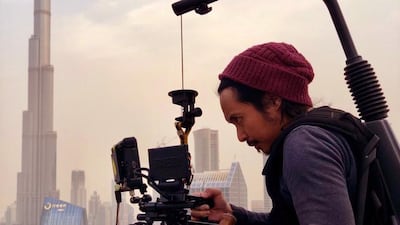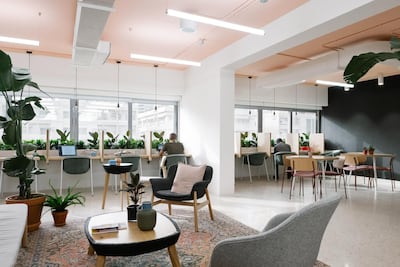As the arts and culture industry continues to confront the financial impact of the pandemic, a government-run initiative aimed at creatives has offered some relief in the form of monetary grants.
In May, the Ministry of Culture and Knowledge Development launched the National Creative Relief Programme, which enables freelancers and SMEs in the creative industries that have been affected financially by the pandemic, to apply for grants.
The first phase of the programme was completed in June, with 50 freelancers and 37 small businesses receiving funds ranging from Dh15,000 to Dh50,000.
One of the recipients is Kamil Roxas, founder of video production company Hello Project Space. Before stay-at-home orders were introduced in Dubai, the filmmaker had a number of projects lined up, including a car commercial and a documentary about Expo 2020.
“All those got cancelled,” he says. His income between the months of March and June would have amounted to at least Dh50,000. “In the weeks after that it became harder and harder to get by, and there were no projects. It was a lot of scrambling to balance finding work, paying the bills and so on.”
In addition to limited income options, Roxas was also facing office rental payments and salaries for his two employees. “Approaching banks for a loan would have been one of the surest ways to stay afloat, but I didn’t want to do that,” he says.
Roxas, who moved to the UAE from the Philippines 14 years ago, got his start in filmmaking at the Middle East International Film Festival, which later became Abu Dhabi Film Festival. He has been running his business since 2013.

He applied for the relief programme shortly after it was announced. Part of the requirements for the application include proof of cancelled contracts to show financial losses, along with bank statements and trade licenses. Roxas was approved for a grant and received what he describes as a “generous amount”, enabling him to pay for his trade licence, rent and employee salaries for two months.
As restrictions ease in Dubai, production jobs are slowly trickling in, despite the typically sluggish summer season. Still, there are challenges ahead as clients slash budgets for projects.
“You get emails asking for ‘Covid discounts’,” says Roxas. “It’s a double-edged sword. If you don’t say yes, you may lose the job. Their budgets have been cut, too, so we have to find a way to compromise and scale down [production].”
There is also the issue of health and safety during shoots. “Social distancing guidelines are still taking a toll when it comes to face-to-face interactions to do work, even when we’re filming outside. When you’re filming a commercial, that’s easily 15 to 20 people in one place. It’s not like the virus has gone. We’re just learning to live with it. Safety is the priority, but we have to start making money again.”
For freelancer Gael Sastre, the pandemic put her plans for a career shift on pause. The make-up artist obtained her freelance licence in November after leaving a corporate marketing job. “I was still quite new to the industry. I was able to secure a big job, but because of Covid, it got pushed back.”
Though she is self-employed and doesn’t have to pay for office space, Sastre had other financial responsibilities, including rent and loan repayments. She says the grant, which she received within a week of being notified that her application had been accepted, has enabled her to cover monthly expenses for the next couple of months. “It was a big help,” she says.
However, her future in make-up artistry is uncertain. In November, she will have to pay for the renewal of her freelance permit, a sum of about Dh9,000. If she is unable to save enough, she says she might have no choice but to find an office job again.
For Salem Al Qassimi, owner of the independently funded and run Fikra Design Studio, the programme granted his business Dh50,000. The company has been around since 2006, expanding into more community-orientated ventures such as co-working space Fikra Campus in 2017 and the Fikra Graphic Design Biennial in 2018.
Because of the pandemic, Fikra suffered a substantial loss in earnings and projects.
Like other businesses, Fikra’s office space was closed and Fikra Campus and its cafe were not operating. In this period, Al Qassimi says his priority was to pay the salaries of the design studio’s eight employees, as well as utility bills and office rentals. He also opted to forgo his salary at the company to help cut costs.
“We weren’t able to get income for salaries. At the same time, we were trying to think of ways to help the community and also generate more business,” he says.
Fikra launched a Covid Relief Package as a response to these concerns. The package offered free design services to health and charity organisations dealing with Covid-19 and discounted design consultation rates for struggling SMEs.
When the grant was extended to Fikra, Al Qassimi was able to pay his employees and cover utility bills. “The fund was extremely helpful in sustaining the team and ensuring everyone is around to do the work,” he says.
He was also able to invest a percentage of the grant into the development of a strategy consultation arm within the company, which is proving to be a good source of revenue and could help carry Fikra forward.
Since the reopenings, Al Qassimi says business is coming back. “Things are picking up. We’re getting a lot of requests right now,” he says, adding that the concept of Fikra’s Covid Relief Package has led to other SMEs approaching them for collaborations. “People are trying to move on, and they’re trying to find ways to make it all work. As a business owner, you have to be cautious, but you have to be hopeful as well. You have to try to hustle. It’s part of entrepreneurship.”
The second phase of the National Creative Relief Programme is now under way. The ministry has increased the range of its fund to Dh15,000 to Dh75,000 and is allowing SMEs of up to 20 employees to apply. The second phase closes on Tuesday, July 14.
More information can be found on the ministry's website



